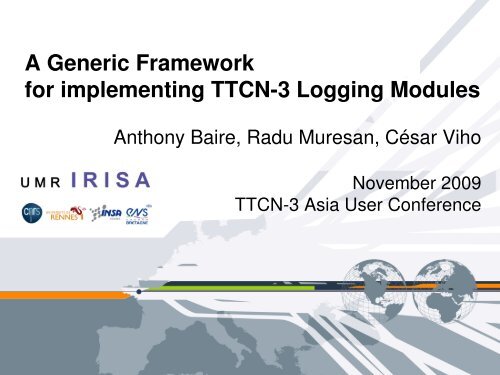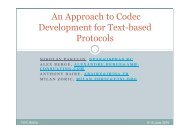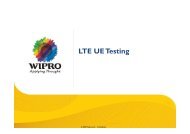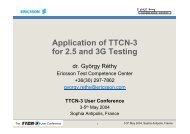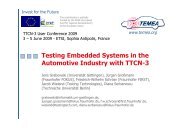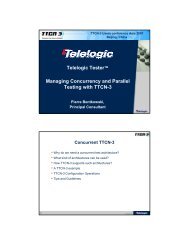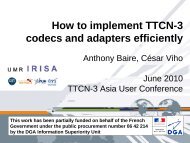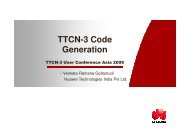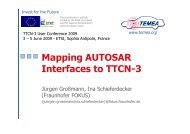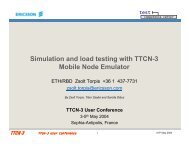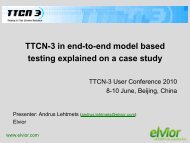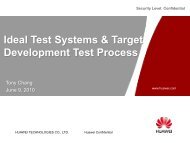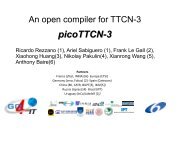Test Logging - TTCN-3
Test Logging - TTCN-3
Test Logging - TTCN-3
You also want an ePaper? Increase the reach of your titles
YUMPU automatically turns print PDFs into web optimized ePapers that Google loves.
A Generic Framework<br />
for implementing <strong>TTCN</strong>3 <strong>Logging</strong> Modules<br />
Anthony Baire, Radu Muresan, César Viho<br />
November 2009<br />
<strong>TTCN</strong>3 Asia User Conference<br />
1
• The language is<br />
well formalised<br />
<strong>TTCN</strong>3 and <strong>Test</strong> <strong>Logging</strong><br />
➔<br />
most of available tools<br />
provide a generic<br />
logging module<br />
➔<br />
test developers do not<br />
have to implement logging<br />
2
Why do we need<br />
specialised logging modules ?<br />
• Some examples:<br />
– to describe the content of the messages<br />
– to use a specific presentation format<br />
– to reconstruct a session from different packets<br />
3
Example 1: describing a message<br />
Existing solution in LibSip<br />
type record Request<br />
{<br />
RequestLine requestLine,<br />
MessageHeader msgHeader,<br />
MessageBody messageBody optional,<br />
Payload payload optional<br />
}<br />
type record REGISTER_Request<br />
{<br />
RequestLine requestLine,<br />
MessageHeader msgHeader,<br />
MessageBody messageBody optional,<br />
Payload payload optional<br />
}<br />
type record INVITE_Request<br />
{ ... }<br />
type record OPTIONS_Request<br />
{ ... }<br />
...<br />
Generic type definition<br />
for a SIP Request<br />
14 similar definitions<br />
for each variant of<br />
SIP Request<br />
« the introduction of the specific types<br />
is to enable better means for logging »<br />
4
Example 1: log traces<br />
using a generic type<br />
using multiple types<br />
(workaround)<br />
our objective<br />
Request<br />
Response<br />
Response<br />
Response<br />
Request<br />
Response<br />
Request<br />
INVITE_Request<br />
Response<br />
Response<br />
Response<br />
ACK_Request<br />
BYE_Request<br />
Response<br />
INVITE Request<br />
100 Trying<br />
180 Ringing<br />
200 OK<br />
ACK_Request<br />
BYE_Request<br />
200 OK<br />
5
Example 2: presentation format<br />
• How to represent an IP Address in <strong>TTCN</strong>3 ?<br />
– octetstring ➞ 'C0A8002A'O<br />
– bitstring ➞ '1100000010101000<br />
0000000000101010'B<br />
– integer ➞ 3232235562<br />
– charstring ➞ ''192.168.0.42''<br />
– record of ➞ {192, 168, 0, 42}<br />
Preferred format for<br />
manipulating IP addresses<br />
Preferred format for<br />
presenting IP addresses<br />
– record ➞ {a:=192, b:=168, c:=0, d:=42}<br />
6
Example 3: reconstruct a conversation<br />
• A useful feature wireshark provides<br />
7
How to implement a logging module for a<br />
<strong>TTCN</strong>3 test suite?<br />
ement<br />
face)<br />
TCI<br />
<strong>Test</strong> Executable<br />
(<strong>TTCN</strong>3 <strong>Test</strong> Suite)<br />
TRI<br />
apter<br />
<strong>Test</strong> <strong>Logging</strong><br />
(test reports / user interface)<br />
CoDec<br />
(message<br />
formatting)<br />
Platform Adapter<br />
• Use the TCITL (<strong>TTCN</strong>3<br />
Control Interface)<br />
– a standard interface<br />
– it reports all events in<br />
the test execution<br />
(eg. message sent)<br />
with the SUT)<br />
(external functions, timers)<br />
– usable in C/Java/XML<br />
8
Implement the TCITL interface...<br />
at what cost?<br />
– 100+ functions to be provided by the TL module<br />
– ~9 parameters in each function<br />
– Flat design: one event ➞ one TL function<br />
– TCITL is still evolving<br />
➔<br />
a huge task... and this just to support the TL interface<br />
9
The TL Dilemma<br />
– Most of the tasks of a TL module are generic<br />
• display the events, draw sequence charts<br />
• load/save the logs on the disk<br />
• provide a GUI<br />
– a tiny part in the TL is specific to the actual test suite<br />
• describe the content of the messages<br />
• present a type in a specific format<br />
➞ choosing between a generic logger or a homemade<br />
logger is an allornothing situation<br />
10
Objectives for our TL Framework<br />
– provide a generic representation for TL events<br />
• easy to define<br />
• easy to update (futures changes in the standard)<br />
• easy to browse (without knowing the their structure)<br />
– provide means for storing the logs<br />
– allow to implement new backends independently<br />
11
Example of TCITL functions<br />
void tliTcStop<br />
(String am, long int ts, String src,<br />
long int line, TriComponentId c)<br />
void tliLog<br />
(String am, long int ts, String src,<br />
long int line, TriComponentId c,<br />
String log)<br />
common<br />
parameters<br />
void tliPMap<br />
(String am, long int ts, String src,<br />
long int line, TriComponentId c,<br />
TriPortId port1, TriPortId port2)<br />
eventspecific<br />
parameters<br />
12
Representation of Events<br />
Event<br />
Event0<br />
Event1 Event2 ... Event10<br />
EventTliTcStop<br />
EventTliAEnter<br />
EventTliLog EventTliPMap EventTliPrReply_m<br />
13
TL Module layout<br />
Console Back End<br />
TCI<br />
TE<br />
TCI TL<br />
implementation<br />
Event<br />
Publisher<br />
XML Back End<br />
possible future backends<br />
Generation<br />
of Event<br />
GUI<br />
HTML report<br />
14
Advantages of the framework<br />
• A generic Event format<br />
– Backend implementation is easier<br />
• no need to know about all possible events<br />
• insensitive to future changes in the TCI standard<br />
• XML format for storing event<br />
– standard format → good interoperability<br />
– ability to convert old log files to future TL formats<br />
using XSL transformations<br />
→<br />
good durability<br />
15
Future tasks<br />
• Define interfaces to allow :<br />
– implementing specific presentation formats<br />
– analysing the messages and generating a description<br />
• Implement a GUI<br />
16
Conclusion<br />
• Specialised <strong>Test</strong> Loggers are useful<br />
• TCITL does not facilitate the development of<br />
modular & reusable TL modules<br />
17<br />
• The proposed framework aims to solve this issue<br />
– Modular design<br />
– Insensitive to future API changes<br />
– Open source
Questions ?<br />
Contacts: abaire@irisa.fr / viho@irisa.fr<br />
The logging framework will be distributed in future releases of<br />
T3DevKit<br />
→http://t3devkit.gforge.inria.fr/<br />
18


